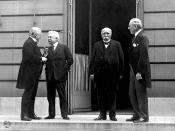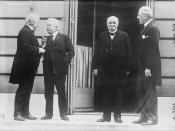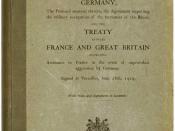-Treaty of Versailles-
"As solders on the battlefields celebrated, families reunited, and the unlucky ones mourned, the war was finally over, as of 11 o' clock on the morning of November 11th in 1918 (Vaughan, 1-2)." The solders that survived came home, and the unlucky ones did not; some families united, and other families mourned for their loved ones. Everybody started celebrating the end of the first major war, where so many young lives were lost; so many people were permanently scarred for life or suffered horrible war-injuries (Vaughan, 1-2).
The Treaty of Versailles was the treaty formed at the end of World War I, which many historians say caused the next major war, WWII. The reason for this, they say, is because of too many harsh laws included in the treaty, which put the full blame of Germany. Germany was blamed, because they lost the war, and so every other country used them as easy scapegoat, for all of the damage and loss of lives that had just happened.
Of course as the scapegoat, Germany was forced and had to pay huge amounts of reparation fees and had to give up most of their land for no real apparent reason (Vaughan, 1-2). All of these heavy burdens and mistakes were just being thrown on the Germans and their nation for no other reason than the fact that they had lost the war. Germany did not even start the war, at a matter of fact (abid).
Two month later, after WWI, leaders gathered in Paris to make a treaty, the treaty of Versailles. This treaty like all treaties in history, was to help maintain peace and to prevent war. But in this case, it is not the same. The treaty actually encouraged war, than to prevent it (nv.cc.va.us).



Well Done!
Good Job, Well written and well informed
4 out of 4 people found this comment useful.